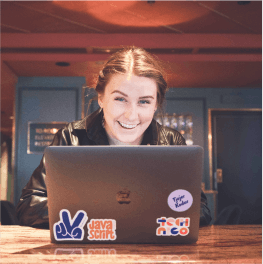

Story
I Went From Competing With Others to Having a Skill to Create the Solution Myself
Name Mattias Andersson
Background Journalist
Current Frontend developer/Journalist at Aftonbladet
Graduation May 2018
Mattias work at Aftonbladet, Swedens biggest news provider both online and newspaper, as journalist. Now he is working for the entire organization thanks to ability to combine coding, journalism and being a stakeholder.
Hi Mattias, tell us a bit about yourself. What makes you you?
I’d been working at Aftonbladet’s sports desk for 20 years. During the past few years, I’d been working a lot with storytelling, looking for features to add to the story and for ways to make them stand out. That’s what encouraged me to learn coding – to help me tell those stories in a more user-friendly and appealing way.
What did you do before Technigo?
I had a lot of contact with development teams as a stakeholder but was not able to make any solutions by myself. It was a bit frustrating at times when my section had to wait a long time for something to get developed. Sometimes we couldn’t get what we requested at all due to these constraints.
When did it first occur to you that you’d like to educate yourself in frontend?
Two of my colleagues actually joined Technigo’s first 12 weeks course and highly recommended I join one. They inspired and encouraged me to take the step.
I was generally curious to learn new things. I’m a self-taught journalist. I originally studied economics.
What were your main reasons to join Technigo?
I wanted to be able to do some of the things I ordered as a stakeholder myself and not always have to wait for development. I was aware that I would not be able to do the most complex solutions after joining a 12 week course. But only being able to do some of the things we had to wait for or pay a lot of money for was a good enough reason for me to educate myself. Journalism is a very competitive field. You want to be first with a story, you want your story to be the best. I felt shortening the time to delivery would be a major advantage for us.
“I wanted to be able to do some of the things I ordered as a stakeholder myself and not always have to wait for development.”
Why Technigo?
Two of my colleagues gave Technigo good references. The concept of learning something practical in 12 weeks and being able to use it right after was really cool – and I can confirm, it’s true! I was able to use my new skills at work right away.
What was the best thing about learning these new skills?
To make solutions for Sweden's biggest news page. Additionally, having a much better understanding of how difficult it is to develop a solution and understanding in what effort might be needed to create solutions is important knowledge.
What are you doing now? Are you combining your new skills with your old ones?
I work with the whole organization now, project managing and as a stakeholder for developing teams in Sweden, Norway and Poland. And of course, I also code. I share my time between these responsibilities. I’m definitely a better stakeholder today than I was before the course, because I have a much better understanding of what’s simple to do and what’s more complex.
Do you still work as a journalist?
A big part of my job still is journalism. You need the journalist mindset to create stories and content solutions, so yes, that's still something which is really important. Combining the journalist mindset with my new skills makes me a much better employee overall.
Has learning your new skills influenced any other part of your life?
I’ve been coding a little bit by myself in my free time, but because I work a lot I mainly use them at work.
Any advice for someone considering to add coding skills to what they’re doing?
Take the step and challenge yourself. It will be hard, you will be struggling sometimes, but the reward will come. If you can combine coding with another previous competence, you’ll likely have a unique skill set that is extremely valuable to the labour market.
What was the most challenging thing about taking this step?
The course itself was challenging. It was a fast-paced course that took a lot of time. It takes effort and a lot of energy to to be a part of an intense course. But it was definitely worth it.
What’s next on your agenda? Any more skills you want to learn?
I would like to learn even more about coding. I’d actually like to learn by coding. I went to a conference, the Nations Institute for Computer-Assisted Reporting, in Los Angeles focused on coding for journalists in march 2019 to deepen my interest.




We're a female-founded, remote-first community helping people get a career they love. 90% of those attending our boot camps are women.
